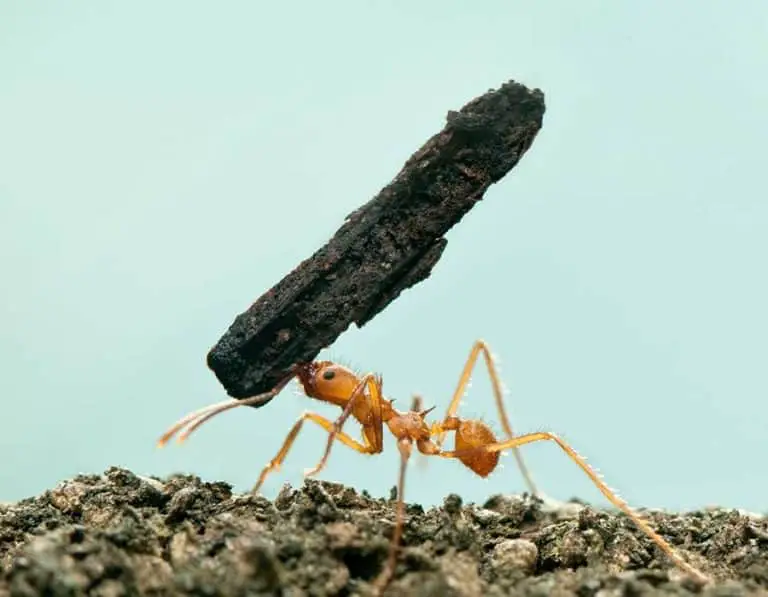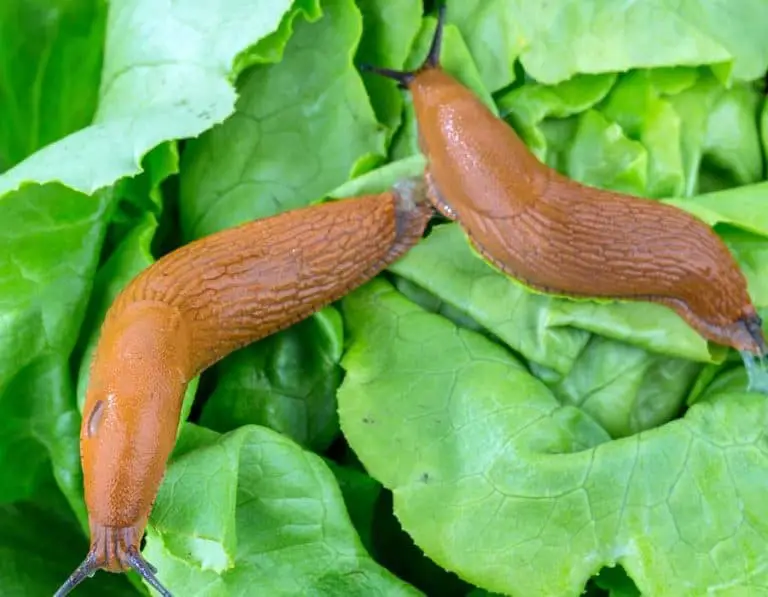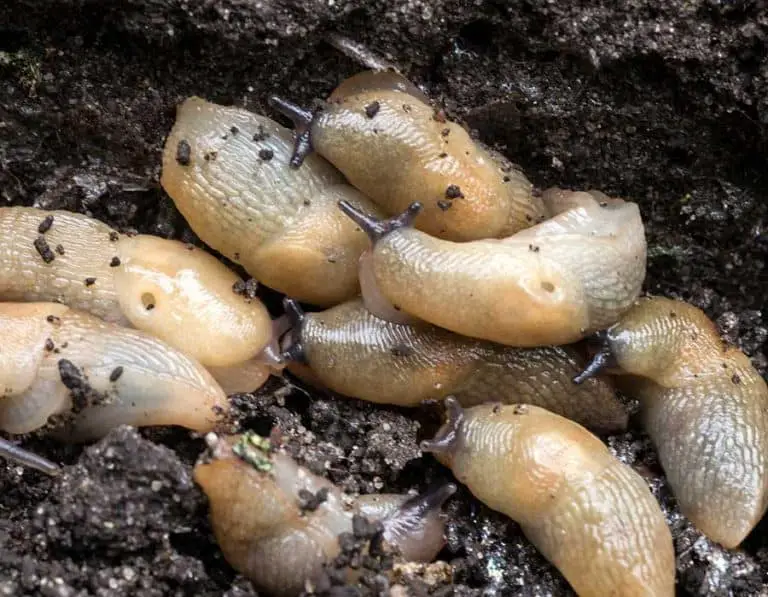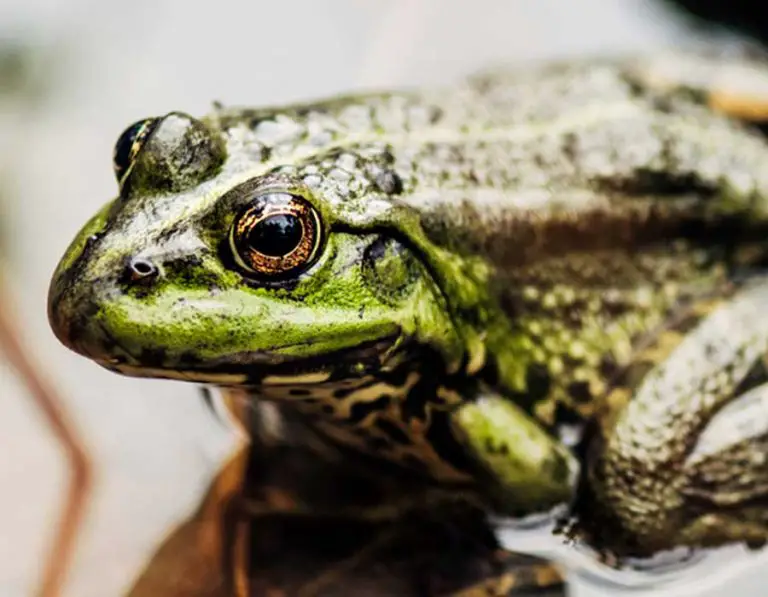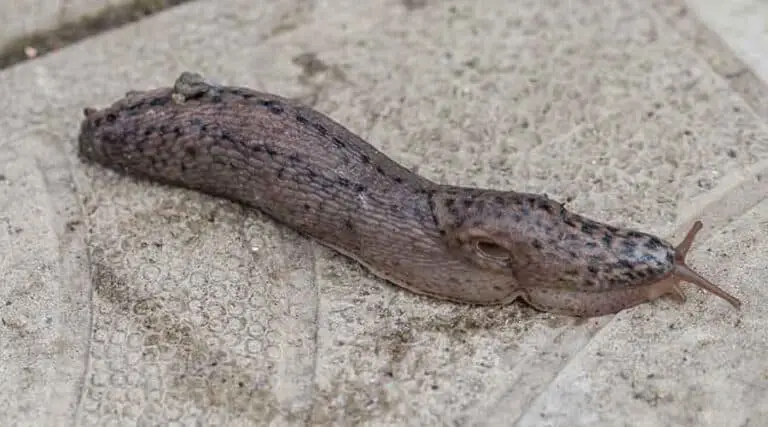Using Salt to Control Slugs: Is it Cruel?
Slugs aren’t the quickest garden pests, but they’re tenacious. When they do find your garden, they can wreak havoc on your plants. Salt is the go-to solution for most gardeners trying to get rid of slugs. But is using salt to kill slugs cruel?
Salt works by dehydrating slugs and causing them to shrivel up and die. It’s a quick and effective way to kill them, but some people argue that it’s inhumane.
We believe it is cruel to salt a slug. Sprinkling salt on a slug causes osmosis to occur, causing the slug to dehydrate and die quickly. If humans poured salt into their open eyes, they would be similarly affected – can you imagine the pain this would cause?
Many individuals are unaware of any other methods to eliminate slugs; even if there are several. Let’s discuss what salt does to a slug and what other more humane methods of controlling slugs there are.
What Are Slugs?
Slugs are a type of mollusk that doesn’t have a hard shell. Instead, they have a soft, slimy body that is protected by mucus. This mucus helps them to move around and also keeps their bodies moist so that they don’t dehydrate.
There are different types of slugs, but the most common garden variety is the gray garden slug. These slugs are typically gray or brown and can grow to be about 2-3 inches long.
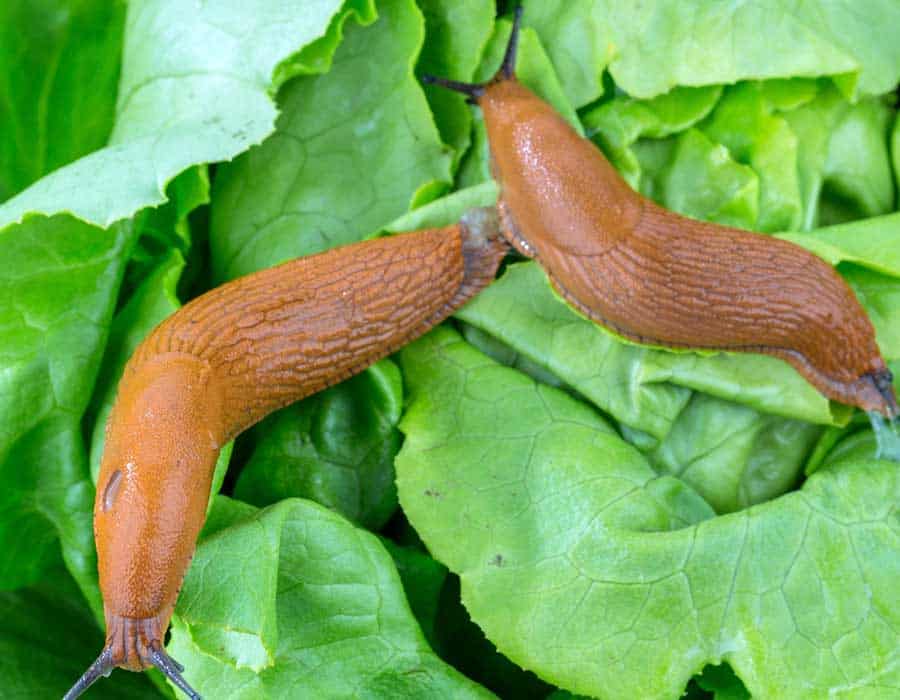
While slugs may not look like much, they can do a lot of damage to your garden. They’re known for eating just about anything, including plants, vegetables, fruit, and even other slugs!
Slugs are most active at night or in cool, damp conditions. This is why you’ll often find them in your garden after a rainstorm. If you live in an area with a lot of moisture, you’re likely to have more problems with slugs than someone who lives in a drier climate.
What Do Slugs Eat?
Slugs are mostly herbivores, which means that they primarily eat plants. However, they will also eat other things if they’re hungry enough. This includes other slugs, dead animals, and even feces. In the wild, slugs help to break down organic matter and recycle nutrients back into the soil. But in your garden, they can quickly decimate your plants.
Slugs will eat just about any type of plant, but they seem to prefer tender, young leaves. This means that seedlings and young plants are at a higher risk of being eaten by slugs.
Slugs will also eat ripe fruit and vegetables, leaving you with nothing to harvest.
Some of a slug’s favorite garden plants include:
- Lettuce
- Spinach
- Cabbage
- Strawberries
- Tomatoes
If you have any of these plants in your garden, you’ll need to be extra vigilant about controlling the slug population. Slugs will also eat flowers, so even your pretty annuals and perennials are at risk.
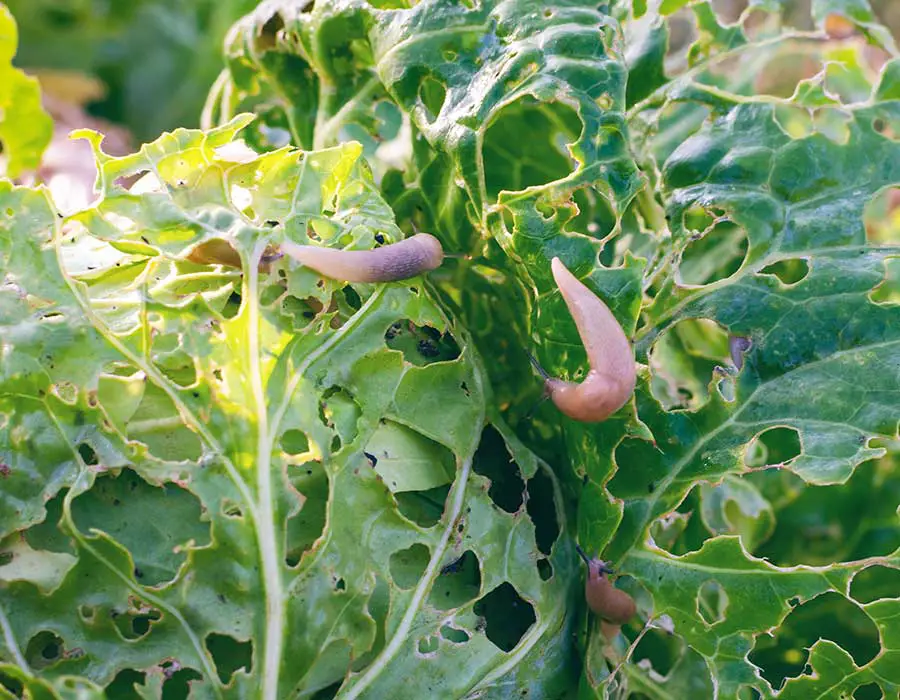
Does Salt Kill Slugs?
Yes, salt does kill slugs. Salt works by dehydrating the slug, causing it to shrivel up and die. This is because of a process called osmosis. Osmosis is when water moves from an area of high concentration to an area of low concentration.
When you sprinkle salt on a slug, the water inside the slug starts to move out of the slug’s body and into the salt. This causes the slug to dehydrate and eventually die.
Is It Cruel to Put Salt on Slugs?
While salt is an effective way to kill slugs, it is also a very cruel way to kill them. Imagine if someone poured salt into your open eyes – it would be extremely painful!
Slugs have mucus on their bodies that helps to protect them from dehydration. This mucus is also what helps them to move around. When you sprinkle salt on a slug, the salt will dissolve the mucus and the slug will be unable to move. The slug will then be stuck in one spot until it dehydrates and dies.
Do Slugs Feel Pain from Salt?
There is no scientific evidence to suggest that slugs feel pain. However, it is possible that they experience something similar to pain.
When you sprinkle salt on a slug, the slug will often react by trying to escape. This may be because the slug is feeling uncomfortable or in distress.
While we don’t know for sure if slugs feel pain, we do know that salt is a very cruel way to kill them. There are other, more humane ways to control the slug population in your garden.
Why Doesn’t Salt Hurt Us The Same Way?
Our bodies are made up of cells that are surrounded by a membrane. This membrane is selectively permeable, which means that it allows some things to pass through and keeps other things out. When salt is sprinkled on our skin, the water inside our cells starts to move out of the cells and into the salt.
However, this process is quickly stopped by the membrane. The water doesn’t have time to move out of all the cells, so we don’t dehydrate and die.
Slugs don’t have this protection. Their cells are not surrounded by a membrane, so when salt is sprinkled on them, the water inside their cells starts to move out of the cells and into the salt. This process is not stopped, so the slug will dehydrate and die.
Does Salt Impact Other Garden Pests?
Salt is a very specific method of pest control. It will only kill slugs and snails, but won’t have any effect on other types of garden pests. If you’re dealing with aphids, caterpillars, or another type of garden pest, you’ll need to use a different method of control.
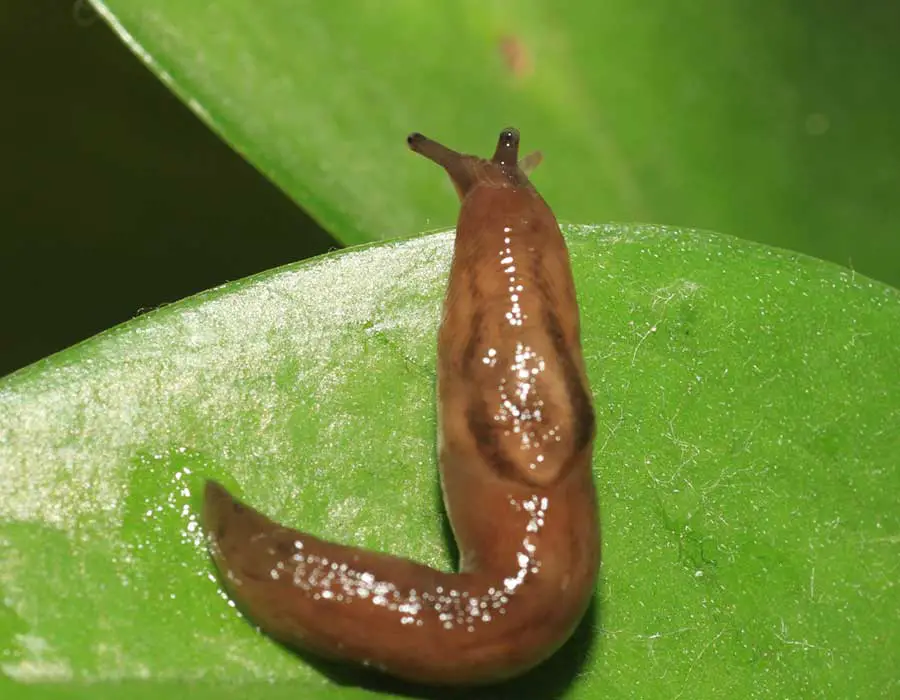
Can Salt be Used as a Barrier to Control Slugs?
Yes, salt can be used as a barrier to control slugs. By creating a line of salt around your plants, you can prevent slugs from getting to them. Slug will never attempt to cross a line of salt, so this is an effective way to keep them out of your garden.
However, a big caveat to this is that using salt on your soil will have terrible long-term effects on your garden.
The salt will quickly lose its effectiveness if it rains or if you water the plant. You may then be urged to add more salt, and the cycle will continue. The salt will eventually increase the soil’s salinity to the point where nothing will be able to grow in it.
Does a Salt Barrier Harm Plants?
Salt can harm plants if it is used too frequently or in high concentrations. When salt is sprinkled on the soil, it will dissolve and start to move through the soil. As the salt moves through the soil, it will start to concentrate in certain areas.
If there is too much salt in one area, it can cause the roots of plants to grow more slowly or even die. Salt can also make it difficult for plants to take up water from the soil.
Soil pH levels will drop dramatically, and plants will begin to die or develop abnormally. Many helpful soil organisms will eventually die.
The garden will gradually become a salt wasteland as a result of the continuous usage of salt.
Because of these factors, it’s critical to use salt only as a last resort. If you do decide to use salt, make sure to follow with fresh water afterward to dilute the salt content in the soil.
Our best advice is to look for alternative methods of slug prevention, as the side effects of salt are not only cruel but cause more damage in your garden.
Alternatives to Salt Barriers
There are many alternative methods of preventing or controlling slugs in your garden. These methods are often more effective than using salt and don’t have the same harmful side effects.
Some alternatives to using salt as a slug barrier include:
Create Natural Barriers
Slugs dislike sliding over rough surfaces, and their soft bellies make them vulnerable to injury. Try some of the following to create natural slug barriers:
- Ground-up Coffee
- Using Crushed Eggshells
- Wood Ashes
- Diatomaceous Earth
- Gravel
Non-Natural Slug Barriers to Buy
Slugs and copper don’t mix. When a slug touches copper, it gets what would feel like a small electric shock that is enough to deter it but not harm it. You can buy strips of copper tape or copper mesh to create a barrier around your plants;
- 【HIGH QUALITY & FLEXIBILITY】Copper conductive adhesive tape is made of premium pure copper foil--high conductive, low resistance, sturdy and durable, anti-rust, anti-corrosion, waterproof and resistant to high and low temperature. With a strong adhesive, it can firmly sticks to almost any clean surface.
- 【DUAL CONDUCTIVITY】Conductive adhesive copper foil tape has dual conductivity so current will flow through both sides and the adhesive, making it easy to electrical repairs, paper circuits, soldering, grounding, etc. No need to worry that the adhesive copper tape will reduce the effectiveness between components.
- 【GREAT FOR EDUCATION AND CRAFTS】Dual conductive copper tape can be twisted, bent and tore, making it easy to shape and mould. With its fantastic pure copper color, it is a fun way to create stained glass pieces, holiday cards, gifts and other DIY crafts.
- 【DESIGNED FOR GUITARISTS】Meideal copper foil tape can effectively eliminate the buzz and noise by applying copper tape to the control cavities, pickups, and the pickguards of your guitar, making your guitar tone perfect.
- 【MULTIPLE APPLICATION】100mm x 3m copper foil tape can be used in stained glass, crafts, paper circuits, decor project, soldering, grounding, electrical repairs, potted garden, transformer, cellphones, computers, printer, LCD monitor, freezer, etc.
- 100% pure copper. Excellent corrosion resistance (will never rust).
- USA made, owned, & operated. Our facility is located in Grand Rapids, Michigan.
- 100' length. 5" wide. The diameter of the mesh coil is approximately 7".
- Copper mesh is great for reflux distilling (where legal). Helps to eliminate sulfur compounds from your distillate.
- Used to clean plastic, rubber, or fiber extrusion equipment. Also molds, dies, screws and similar machinery while the machine or molds are still hot.
Use Plants that Deter Slugs
There are many plants that repel slugs, here’s a snapshot of the most popular:
- Alliums (onions, garlic, chives, leeks)
- Artichokes
- Celery
- Fennel
- Chard
- Cucumbers
- Fennel
- Peas
- Tomatoes
Slugs are also repelled by the following scented plants: lavender, rosemary, begonias, and sage.
Attract Natural Predators
There are many animals that prey on slugs, so one way to control them is to attract their natural predators. Some animals that eat slugs include:
- Birds
- Toads & Frogs
- Lizards
- Geese
- Hedgehogs
- Moles
- Beetles
Increasing the biodiversity of your garden may offer a variety of advantages, including natural and low-cost pest control.
Change a Few Habits to Save Time
As the saying goes, an ounce of prevention is worth a pound of cure. You can save yourself time and money by making a few changes to create a less friendly environment for slugs:
Water your plants in the morning – Changing the time you water your plants might help to reduce the number of slugs in your garden. This simple adjustment has been shown in studies to help prevent slug damage dramatically.
Keep a clean garden – Slugs love to hide away in dark moist places in your garden. Trim back overground leaves and branches, keep large containers raised with footings and make sure any decaying material is moved away to a compost heap which is away from your main planting beds.
Remove the slugs by hand – Taking the time to remove slugs manually can be highly beneficial. Early morning, late evening, or just after it rains are the best times to go slug hunting. Use a pair of gloves to collect them in a bucket and either move them to a place away from the garden or dispose of them humanely.
Conclusion
Slugs can be a real menace in the garden, but using salt to control them is not only cruel but also ineffective in the long run. There are many alternative methods of slug control that are more effective and don’t have the same harmful side effects. The best method of slug control is prevention, so take some time to make your garden less hospitable to these pests.



